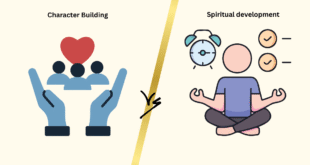Dr. Muhammad Younus Khalid
In today’s fast-paced world, where consumerism and instant gratification dominate, raising children who are truly grateful has become more challenging than ever. Many parents worry about their kids growing up entitled or always wanting more. This is where nurturing gratitude in children becomes a vital part of parenting.
Gratitude is more than simply saying “thank you.” It is an inner attitude of recognizing the blessings in life, appreciating them, and expressing that appreciation through words and actions. When children develop this quality early on, they grow into compassionate, humble, and content adults.
As Muslims, gratitude (Shukr) is deeply embedded in our faith. Allah ﷻ says in the Qur’an:
“If you are grateful, I will certainly give you more.”
(Surah Ibrahim 14:7)
This verse shows how gratitude attracts more blessings and strengthens a child’s spiritual foundation. In this article, we will explore why gratitude is important, the challenges modern parents face, and practical strategies for nurturing gratitude in children.
What is Gratitude?
Gratitude is the act of recognizing and appreciating the good things in life, whether they are material gifts, acts of kindness, or the blessings we often take for granted, like health and family.
While thankfulness is often expressed outwardly by saying “thank you,” gratitude goes deeper. It involves a heartfelt acknowledgment of blessings and a sincere desire to respond positively.
From an Islamic perspective, Shukr is one of the most important spiritual qualities. The Prophet Muhammad ﷺ said:
“He who does not thank people has not thanked Allah.”
(Sunan Abi Dawood)
This highlights that teaching children gratitude is not only good manners but also a form of worship.
Why Gratitude Matters for Children
Raising children with gratitude has numerous benefits:
-
Psychological Benefits
- Children who practice gratitude are happier and more optimistic.
- Gratitude helps reduce anxiety, stress, and depression.
- It builds resilience, helping kids cope with challenges positively.
-
Spiritual Benefits
- Grateful children develop a stronger relationship with Allah ﷻ.
- They become mindful of blessings and less focused on materialism.
- Regular Shukr strengthens their iman and taqwa.
-
Social Benefits
- Grateful kids are more empathetic and caring.
- They develop stronger relationships with family and friends.
- Gratitude discourages selfishness and entitlement.
Research by psychologists like Robert Emmons shows that children who practice gratitude tend to have higher levels of well-being and better academic performance.
Challenges Parents Face in Today’s World
Modern parenting comes with unique obstacles when it comes to nurturing gratitude:
-
Consumerism and Entitlement
Children are constantly exposed to ads and influencers promoting materialism. This makes them believe happiness comes only from getting more things.
-
Digital Distractions
With instant access to games, videos, and apps, kids get used to instant gratification, making it harder to appreciate what they already have.
-
Peer Pressure
Children may compare themselves with friends who have more expensive toys or gadgets, leading to feelings of dissatisfaction.
Practical Strategies for Nurturing Gratitude in Children
Here are some proven, practical ways to instill gratitude in your children:
-
Be a Role Model of Gratitude
Children learn by observing their parents. Express gratitude regularly in front of your kids, for food, family, health, and even small daily blessings.
Example: Instead of complaining about the weather, say, “Alhamdulillah for the rain that nourishes the earth.”
-
Teach Islamic Concepts of Shukr
Explain that gratitude is a part of worship.
- Encourage them to say “Alhamdulillah” frequently.
- Share Qur’anic stories, like Prophet Sulaiman (AS) thanking Allah for his kingdom.
-
Daily Gratitude Rituals
Create small habits like:
- Gratitude journaling before bedtime.
- Sharing three things everyone is thankful for during dinner.
- Making dua together to thank Allah.
-
Encourage Giving and Sharing
When children give to others, they appreciate what they have.
- Donate toys or clothes together.
- Volunteer at community events or charity drives.
-
Use Storytelling
Children connect deeply with stories. Share stories from the Qur’an, Seerah, or personal family history that highlight gratitude.
-
Reduce Materialism
Instead of buying gifts frequently, focus on experiences like family picnics or outings. Teach children that joy doesn’t come only from material possessions.
-
Positive Reinforcement
When your child expresses gratitude, praise them.
Example: “I loved how you thanked your teacher today. That was very kind.”
-
Practice Gratitude Through Dua
Encourage your children to make dua daily, thanking Allah for specific blessings.
Even young children can learn simple duas like, “Alhamdulillah for my family and friends.”
-
Mindful Gratitude in Daily Life
Help kids notice everyday blessings, clean water, electricity, sunshine, and be thankful for them.
-
Create a Family Gratitude Culture
Make gratitude a family value:
- Hang a “Gratitude Wall” where everyone writes what they’re thankful for.
- Celebrate small achievements with words of thanks rather than gifts.
Gratitude Activities for Different Age Groups
Toddlers (2-4 years)
- Teach simple words like “thank you” and “Alhamdulillah.”
- Use songs and rhymes about gratitude.
Young Children (5-8 years)
- Start a gratitude journal with drawings.
- Read stories about thankfulness.
Pre-teens (9-12 years)
- Encourage reflective writing about blessings.
- Involve them in community service.
Teenagers (13+ years)
- Discuss the dangers of materialism openly.
- Encourage them to mentor younger children in practicing gratitude.
Role of Schools and Community
Schools and Islamic centers play a vital role:
- Teachers can include gratitude activities in lessons.
- Mosques can host workshops on Shukr for families.
- Community events can highlight service and charity.
Long-term Impact of Gratitude
Children who grow up with gratitude tend to:
- Develop strong emotional intelligence.
- Have healthier relationships.
- Become generous and resilient adults.
Common Mistakes Parents Make
Avoid these pitfalls:
- Over-rewarding with Material Gifts – Gratitude can’t be bought.
- Ignoring Ungrateful Behavior – Correct gently but firmly.
- Not Modeling Gratitude – Practice what you preach.
Conclusion
Nurturing gratitude in children is one of the most valuable gifts you can give them. By modeling gratitude, creating daily rituals, and connecting thankfulness to faith, you help your child develop a strong moral compass and a joyful heart.
May Allah ﷻ help us raise children who are truly grateful and become sources of goodness for the world. Ameen.
 Edutarbiyah English Blog of Parenting and Tarbiyah
Edutarbiyah English Blog of Parenting and Tarbiyah



